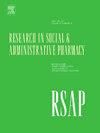Community pharmacists’ role in optimising antibiotic use: The HAPPY PATIENT project to improve dispensing practices in five EU countries
IF 3.7
3区 医学
Q1 PUBLIC, ENVIRONMENTAL & OCCUPATIONAL HEALTH
Research in Social & Administrative Pharmacy
Pub Date : 2025-03-22
DOI:10.1016/j.sapharm.2025.03.064
引用次数: 0
Abstract
Background
Community pharmacies can play a pivotal role in optimising the use of antibiotics through their dispensing practice.
Aim
To evaluate the impact of a multifaceted intervention on community pharmacies’ quality of antibiotic dispensing.
Method
A prospective before–after study conducted according to the Audit Project Odense methodology in community pharmacies in France, Greece, Lithuania, Poland, and Spain. Pharmacy staff audited dispensing practices through a self-registry form before and after a multifaceted intervention, comprising feedback to participants on dispensing practice, communication training, and providing educational materials for patients. Dispensing of all oral antibiotics for five days in February 2022 and after interventions in February 2023 was registered. Data were analysed by country and overall using ten quality indicators, with Chi-square tests and Students’ t-tests applied.
Results
A total of 91 pharmacists registered 5.054 dispenses. There was an 18 % (p < 0.001) improvement in the mean number of safety checks performed and a 17 % (p < 0.001) reduction in the number of dispenses for which no safety checks were performed after the intervention. Pharmacists provided 17 % (p < 0.001) more advice to patients and reduced the dispenses for which no advice was provided by 35 % (p = 0.006). This came with a 44 % (p < 0.001) increase in inappropriate advice that was provided. Large differences between the countries were observed. For performing safety checks, a 13 % (p = 0.004) worsening was seen in Greece and a 72 % (p=<0.001) improvement in Spain. In France, treatment duration and dose were discussed with patients in 97 % and 98 % of the dispenses at baseline, respectively, without improvements after the intervention. In Spain, this was 66 % and 51 % at baseline, significantly improving to 80 % and 64 % after the intervention.
Conclusion
Quality of antibiotic dispensing increased significantly, indicating that intervention is a promising strategy to improve antibiotic use, especially in countries with lower practice standards.
社区药剂师在优化抗生素使用中的作用:HAPPY PATIENT项目改善五个欧盟国家的配药实践
社区药房可以通过配药实践在优化抗生素使用方面发挥关键作用。目的评价多方面干预对社区药房抗生素调剂质量的影响。方法根据审计项目欧登塞方法对法国、希腊、立陶宛、波兰和西班牙的社区药房进行前瞻性前后研究。在多方面干预之前和之后,药房工作人员通过自我登记表格审核调剂实践,包括对参与者的调剂实践反馈,沟通培训和为患者提供教育材料。登记了2022年2月和2023年2月干预后5天内所有口服抗生素的配药情况。数据按国家和总体使用10个质量指标进行分析,使用卡方检验和学生t检验。结果共有91名药师注册药品5.054个。有18% (p <;0.001),安全检查的平均次数提高了17% (p <;0.001)干预后未进行安全检查的配药数量减少。药剂师提供17% (p <;0.001)给患者提供更多的建议,减少35%不提供建议的配药(p = 0.006)。这带来了44% (p <;0.001)不恰当建议的增加。这些国家之间存在巨大差异。在执行安全检查方面,希腊的情况恶化了13% (p= 0.004),西班牙的情况改善了72% (p=<0.001)。在法国,97%和98%的分配分别在基线时与患者讨论治疗时间和剂量,干预后没有改善。在西班牙,这一比例在基线时分别为66%和51%,干预后显著提高至80%和64%。结论抗生素调剂质量显著提高,干预措施是改善抗生素使用的有效策略,特别是在实践标准较低的国家。
本文章由计算机程序翻译,如有差异,请以英文原文为准。
求助全文
约1分钟内获得全文
求助全文
来源期刊

Research in Social & Administrative Pharmacy
PUBLIC, ENVIRONMENTAL & OCCUPATIONAL HEALTH-
CiteScore
7.20
自引率
10.30%
发文量
225
审稿时长
47 days
期刊介绍:
Research in Social and Administrative Pharmacy (RSAP) is a quarterly publication featuring original scientific reports and comprehensive review articles in the social and administrative pharmaceutical sciences. Topics of interest include outcomes evaluation of products, programs, or services; pharmacoepidemiology; medication adherence; direct-to-consumer advertising of prescription medications; disease state management; health systems reform; drug marketing; medication distribution systems such as e-prescribing; web-based pharmaceutical/medical services; drug commerce and re-importation; and health professions workforce issues.
 求助内容:
求助内容: 应助结果提醒方式:
应助结果提醒方式:


